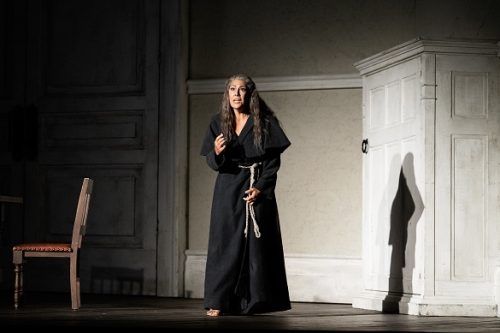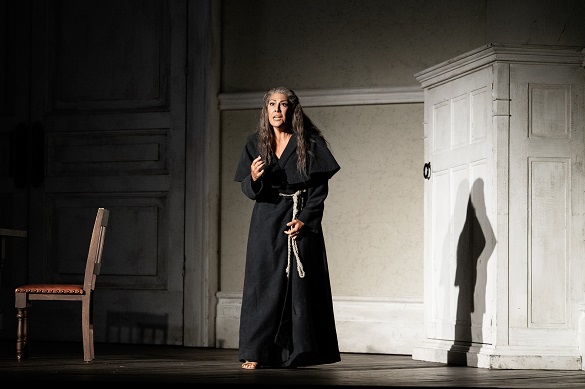 United Kingdom Verdi, La forza del destino (1869 Milan version): Soloists, Chorus and Orchestra of the Royal Opera House, Covent Garden / Sir Mark Elder (conductor). Royal Opera House, Covent Garden, London, 19.9.2023. (CC)
United Kingdom Verdi, La forza del destino (1869 Milan version): Soloists, Chorus and Orchestra of the Royal Opera House, Covent Garden / Sir Mark Elder (conductor). Royal Opera House, Covent Garden, London, 19.9.2023. (CC)

Production:
Original Director – Christof Loy
Associate Director – Georg Zlabinger
Designer – Christian Schmidt
Lighting designer – Olaf Winter
Choreographer – Otto Pichler
Revival Choreographer – Klevis Elmazaj
Dramaturg – Klaus Bertisch
Chorus director – William Spaulding
Cast:
Donna Leonora – Sondra Radvanovsky
Don Alvaro – Brian Jagde
Don Carlo di Vargas – Etienne Dupuis
Padre Guardiano – Evgeny Stavinsky
Fra Melitone – Rodion Pogossov
Preziosilla – Vasilisa Berzhanskaya
Marquis of Calatrava – James Creswell
Curra – Chanáe Curtis
Alcalde – Thomas D. Hopkinson
Mastro Trabuco – Carlo Bosi
Surgeon – Dawid Kimberg
Verdi’s La forza del destino is a work whose actions cover vast temporal spaces. After the first act (set near Seville), the second act moves on a year (and to Cordoba), while the third act is ‘years later’ (a military camp in Italy) then, for its second scene, even three months later than that; finally, act four is in Spain ‘many years later’. Add to this the prequel mime director Christof Loy adds to the Overture – a story of abuse of three (not two) siblings, one of whom perishes – and it looks on paper like disparate pieces of a jigsaw. Neither is a ‘definitive’ score a clear-cut thing: Covent Garden uses the Milan one, its characteristics nicely elucidated in Jim Pritchard’s review of the 2019 production (review click here).
And yet, reframe this as various tableaux, and the piece can work. Certainly, Sir Mark Elder seemed to see it as such, painting each scene with a definite tinta, Christof Loy’s set (designer Christian Schmidt) is constant throughout, with various symbols – Christ on the Cross for the monastery, for example – enabling changes of ‘locale’. And, riffing on Verdi and Piave/Ghislanzoni’s libretto (Antonio Ghislanzoni added text for the 1869 production), Loy continually references the past and past actions via projected video clips, visually distanced via black-and-white.
The Royal Opera House orchestra were on brilliant form, ever responsive to Elder’s sure direction. His tempi seemed perfect – the four hours of the evening (two intervals, both of which seemed to keep to the promised 20 minutes) flying by. While there are moments of brightness – and how Loy revelled in them, moving us close to vaudeville- the overall arc of the opera is from near-darkness to bleak darkness. The plight of the poor (and the religious establishment’s handling of them) pulled no punches. All of this is a massive balancing act for conductor and director: Loy and Elder offered a more than viable solution.
I see from the cast list of 2019 that it was a star-studded occasion, with Anna Netrebko as Leonora, Jonas Kaufmann as Alvaro, Ferrucio Furlanetto as Padre Guardiano, Alessandro Corbelli as Melitone and last but certainly not least, Robert Lloyd as the Marquis of Calatrava. That all sounds very special, but the cast on this occasion seemed remarkably unified in standard, and unified of intent, something that arguably counts for more.

The Donna Leonora here was Sondra Radvanovsky, dramatically compelling and in full control of her range (I had forgotten how well-formed her lower extension is). The way she spun the first ‘Pace’ of the final act’s ’Pace, pace, mio Dio’ was heart-stopping and her final cries of ‘Maledizione’ unforgettable. Matching her was Brian Jagde’s Don Alvaro, strong-voiced, heroic, and in turn too was an assumption even more impressive as it was a stand-in – I would defy anyone to tell that on the basis of the stage action – the Don Carlo di Vargas of Etienne Dupuis (replacing Igor Golovatenko). Dupuis has a phenomenally powerful, dark voice that is the perfect vocal foil to Jagde’s tenor, and their scenes together (it’s fair to say they have beef) were of the highest Verdian standard.
The clerics were well cast. Evgeny Stavinsky was a solid Padre Guardiano, Rodion Pogossov an equally convincing Fra Melitone. Carlo Bosi made much of the comedy-oriented part of Mastro Trabuco, and James Creswell had fine presence – both stage and vocal – as the Marquis of Calatrava.
It is testament to the strength of fringe opera in London that for the character of Preziosilla, one can positively reference Regent Opera’s 2022 staging of Forza in Fulham, and its Preziosilla, Kamilla Dunstan, who was something of a force of nature. The Preziosilla here, Vasilisa Berzhanskaya, despite her decidedly international profile and the gift of Loy’s colourful staging, conveyed rather less of this character’s sass.
Few performances truly live and breathe the air of Verdi and it was a privilege to attend one that did. Sir Mark Elder brought a wealth of experience to this Forza and the insights from the pit just kept on coming. Split-second precision was married with some meltingly beautiful solo moments (too many to individually mention).
The combination of Loy’s insights (I am aware of other critical voices who may disagree!) and Elder’s own illuminations plus a cast that acted as a company rather than a constellation of stars was, on this particular evening, revelatory. If I had five stars, I would give them.
Colin Clarke
